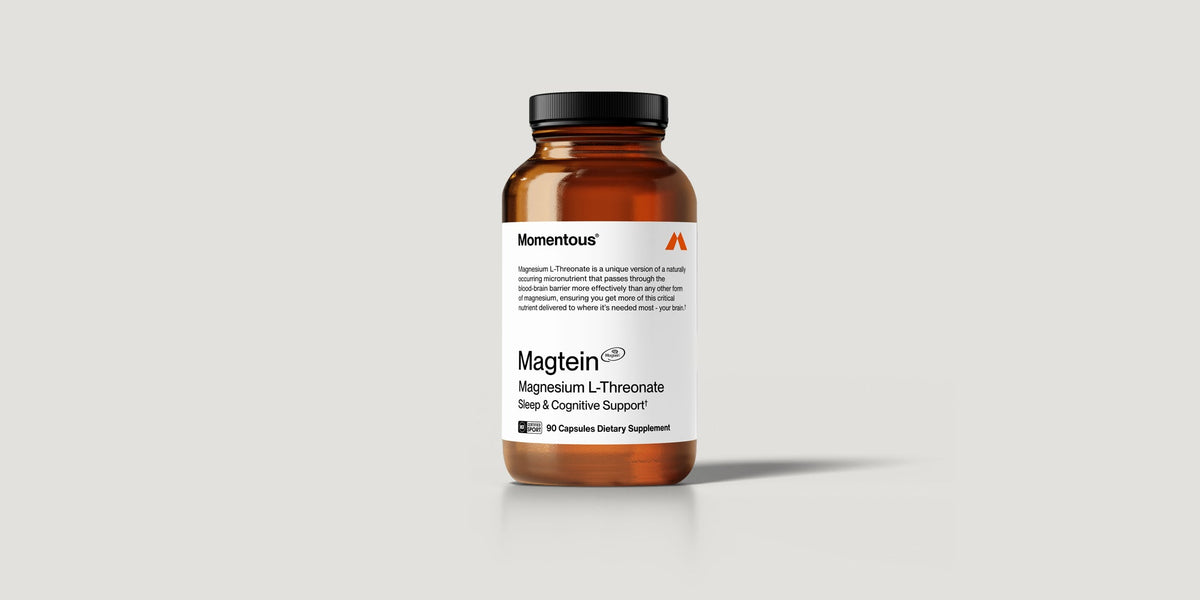
Magnesium Threonate vs Glycinate: Key Differences and Benefits
|
|
Magnesium threonate is a supplement that contains the L-threonate form of magnesium. It is typically used to help improve sleep and cognitive function. Magnesium glycinate is formed by combining magnesium with the amino acid glycine. It is highly bioavailable, meaning it is easily absorbed by the body.
While magnesium threonate (or magnesium L-threonate as it is also known) is key for cognitive support and sleep, magnesium glycinate is more commonly used to treat magnesium deficiency. It’s also more popular as it’s less expensive than magnesium threonate.
But there’s a lot more that most people should be aware of when it comes to the differences between these two magnesium supplements. This article will uncover the nuances between magnesium threonate and glycinate—particularly their effects on sleep, cognitive support, brain health, and magnesium deficiencies—to help you choose the best supplement for your health goals.
Magnesium threonate is a supplement that contains the L-threonate form of the mineral magnesium. It is sourced through a meticulous manufacturing process that combines magnesium with threonic acid, a breakdown product of vitamin C, to create a highly bioavailable form that can effectively reach the brain.
Dietary sources of magnesium threonate include spinach, legumes, bananas, chocolate, nuts, and black beans. However, research suggests that up to 50% of people in the U.S. could have a magnesium deficiency, which is why supplementation can prove useful.
Magnesium threonate is a relatively new discovery, having only been identified in 2010. As a result, research around the supplement is still in its infancy, but studies have shown it can play a crucial role in helping brain health and cognitive function, particularly among older people.
Magnesium threonate has been shown to pass through the blood-brain barrier more effectively than any other form of magnesium, which is why one key benefit of magnesium threonate is its calming, relaxing effect on the brain. This in turn can help improve sleep, especially falling asleep and staying asleep. (Note: Magnesium L-Threonate is one of three ingredients in Momentous Sleep).
Another notable benefit is its impact on brain health and cognitive function, particularly memory, learning, attention, and focus. In one study, subjects received 2 grams of MagteinⓇ (magnesium threonate) for 30 days while another group received a placebo. The Magtein group recorded better scores in a clinical memory test after the 30-day period than their placebo counterparts.
Magnesium glycinate is the combination of magnesium with the amino acid glycine. It is highly bioavailable, meaning the magnesium is easily absorbed through your small intestine. Dietary sources of magnesium glycinate include leafy greens, nuts and seeds, and fruits such as bananas, dried figs, and blackberries.
Due to its high bioavailability and rate of absorption, magnesium glycinate can be beneficial for people experiencing magnesium deficiencies or with conditions that can lead to magnesium deficiencies. It can help with anxiety, depression, sleep, blood pressure and blood sugar regulation, PMS (premenstrual syndrome), and pain relief.
One meta-analysis showed that magnesium supplementation helped reduce fasting blood sugar levels and improved insulin sensitivity in people with diabetes. Another study that analyzed findings from 24 studies found that people with diabetes who took magnesium supplements had significant reductions in fasting blood sugar, HbA1c, systolic blood pressure, and diastolic blood pressure.
Another research review found initial evidence suggesting that magnesium glycinate supplementation could potentially reduce mild anxiety symptoms, generalized anxiety, anxiety-related PMS symptoms, and depression symptoms.
| Threonate | Glycinate | |
|---|---|---|
| Key Benefit | Sleep and cognitive health | Improving magnesium deficiencies |
| Dosage | 145mg daily | 300-400mg daily |
| Onset Time | 7 days to 4 weeks | 2 to 4 weeks |
| Cycle | Take daily | Take daily |
| Side Effects | Excessive amounts can have a laxative effect | Excessive amounts can lead to nausea, diarrhea, and abdominal pain |
| Best for | Sleep, cognitive health | Improving magnesium levels |
While magnesium threonate and glycinate are different forms of magnesium, there are some similarities.
Both are bioavailable forms of magnesium, meaning they are easily absorbed by the body. They can both help improve magnesium levels, reduce stress, alleviate anxiety, and improve sleep quality.
If you’re looking to improve your sleep, calm or quieten your brain, and enhance cognitive function then magnesium threonate is the best form of magnesium for you. For those looking to address a magnesium deficiency—and a more budget-friendly option—then magnesium glycinate is an ideal choice.
And if you're looking for a high-quality magnesium l-threonate supplement that's fully NSF- and Informed Sport-certified, check out Momentous Magnesium Threonate.
Here’s what some of our customers are saying about this product:
“Noticed right away that my REM sleep increased considerably after I started taking this! Highly recommend!”
-Lisa P.
“I’ve just started my second bottle…..within 48 hours my sleep was monumentally improved! I’ve gone from 4 to 6 hours [of sleep] a night to consistently sleeping 7 to 9 hours EVERY night. I’m sure there are other less dramatic improvements. Once I get over the sleep improvements, I’ll have time to analyze the nuanced changes.”
-Janice E.
“I have never fallen asleep and stayed asleep so well in my life. This has changed sleep for me in the best way!”
-Jacqueline B.
Momentous recommends taking magnesium threonate 30-60 minutes before bed. This allows the supplement to promote relaxation and support a restful night's sleep. Magnesium glycinate can be taken at any time of day.
Magnesium threonate and magnesium glycinate can be taken together. Consider how much magnesium you’ll be taking in, though, so that you don’t consume excessive amounts. It is advisable to consult with a healthcare provider to ensure safety and proper dosing.
Yes, magnesium threonate and magnesium glycinate are safe to take daily. In fact, consistent daily supplementation is recommended for best results.